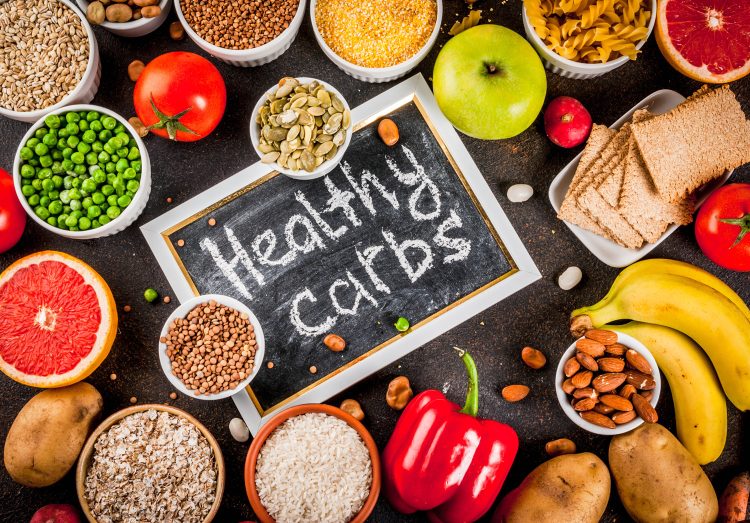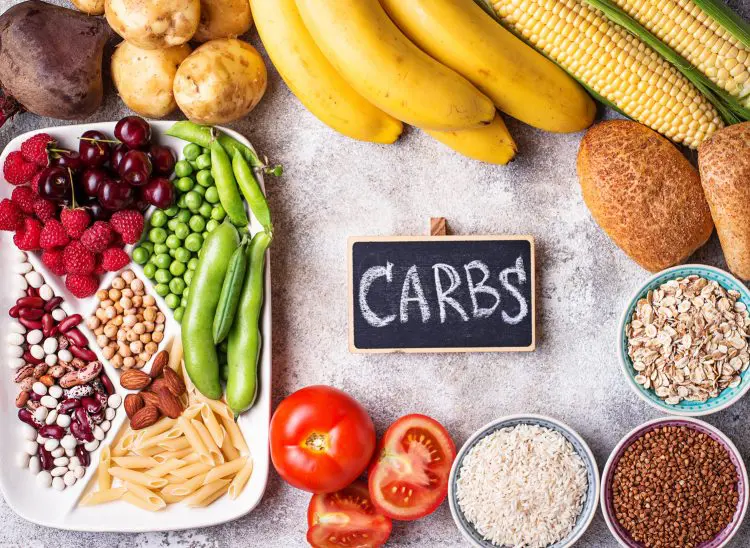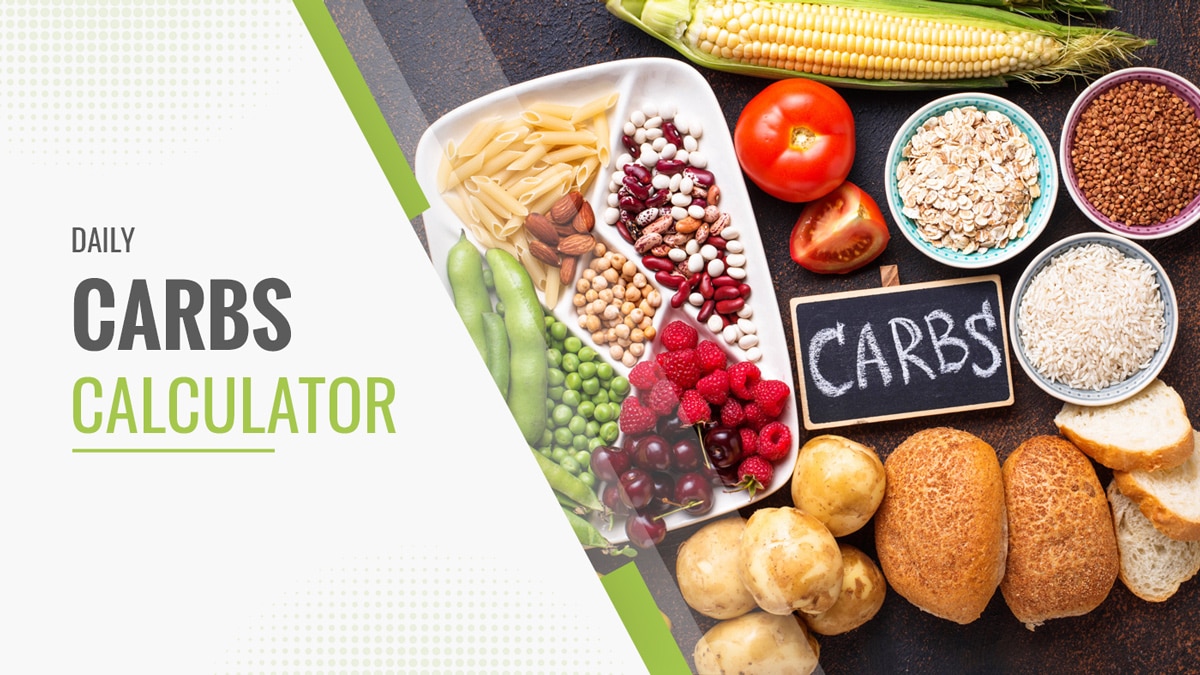Carbohydrates are essential for providing energy for daily activities. Our calculator offers recommendations for a moderate-carbohydrate diet to support fat loss and muscle gain. Discover the optimal percentage of daily carbohydrate intake for an individual’s unique needs and goals.
Daily Carbohydrate Intake Calculator
Result:
What are Carbohydrates?
Carbohydrates are one of the three primary macronutrients that provide energy to the human body, along with fats and proteins. Upon consumption, carbohydrates are broken down into glucose and serve as the body’s main source of fuel. Excess glucose can be stored in the form of glycogen for later use or converted into fat for long-term energy storage.

Determining Carbohydrate Content in Food
To determine the carbohydrate content in your food, you can use food labels or weigh your food on a food scale and consult an online nutritional database. While weighing your food may seem tedious at first, it becomes easier with practice.
Are Carbohydrate Bad?
NO, contrary to popular belief, carbohydrates are not inherently bad for you. While consuming excessive amounts of carbohydrates may lead to weight gain, incorporating them into your diet in appropriate quantities and at the right times can provide numerous benefits.
According to experts, one optimal time to consume carbohydrates is before and after workouts. This allows your body to use the carbohydrates as a source of energy and replenish glycogen stores that are depleted during exercise. Additionally, consuming carbohydrates in the evening will not hinder weight loss. In fact, eating most of your daily carbohydrate intake at dinnertime can actually aid in fat loss and hormone optimization.
Understanding Different Types of Carbohydrates
Carbohydrates are classified as either simple or complex. Simple carbs include sugars like monosaccharides and disaccharides, while complex carbs include starches and fibers like polysaccharides and oligosaccharides. But here’s the thing: many foods contain both simple and complex carbs, so it can be tricky to classify them.
While our bodies don’t technically need carbohydrates to function, they’re an efficient source of energy. And when consumed in moderation, carbs can actually help reduce the risk of certain health conditions like cardiovascular disease, obesity, and type 2 diabetes.
Carbohydrates come in three main forms: sugars, starches, and fibers.
- Sugars are the simplest form of carbs and can be found naturally in foods like fruits, dairy products, and vegetables. But they’re also found in processed form in sweets like candy, cookies, cakes, and many sugary drinks.
- Starches are complex carbs that can be found naturally in foods like beans, vegetables, and grains.
- Fibers are also complex carbs that can be found in foods like fruits, whole grains, vegetables, and beans. And here’s something important to remember: fibers play an essential role in digestion.
Complex carbohydrates offer more nutritional benefits than simple carbohydrates, often referred to as “empty carbs.” Simple carbs like added sugars provide little nutritional value and aren’t essential for survival. Complex carbs found in fiber-rich fruits and vegetables, whole grains, legumes and other foods provide the body with energy and essential nutrients. These complex carbs are also digested more slowly, helping you feel full for longer periods of time and aiding in weight control.
In contrast, foods high in simple carbohydrates like soda, cookies, juice and baked goods often contain large amounts of sugars and fats that can contribute to weight gain and diabetes when consumed in excess. Instead of consuming sugary foods to meet your body’s carbohydrate requirement, choose complex carbs for their nutritional benefits.
Best Types of Carbs for Muscle Gains

When it comes to losing weight and building muscle, it’s generally best to choose complex carbs from whole foods. These foods break down slowly and provide sustained energy without causing spikes and crashes. Good sources of complex carbs include:
- Sweet potatoes
- Brown rice
- Fruits
- Quinoa
- Oats
- Starchy vegetables like peas and carrots
- Whole grain bread etc.
These foods are high in fiber which slows down digestion and they also retain more micronutrients compared to processed foods. However, there is a time and place for simple carbs as well. Even “bad carbs” like certain types of candy can have benefits when consumed during or after exercise. They can help restore muscle glycogen quickly and speed up recovery.
Related: Comprehensive Guide For Bodybuilding Diets
Recommend Carbs Intake
The Institute of Medicine recommends adults consume at least 130 grams of carbohydrates daily. Carbs should make up 40-75% of daily caloric intake. While not essential nutrients, “good” carbs have benefits. Excess carbs are converted to fat and stored as energy. If insufficient carbs and fats are available for energy, the body breaks down protein instead. As we explain above not all carbs are equal; whole grains, starchy vegetables, fruits and beans are better sources than refined carbs like white bread and rice.
Carb intake depends on personal factors. A low-carb diet can be beneficial for some but not for others. Healthy foods like vegetables, legumes and whole grains contain carbs. Carbs aren’t bad if sugary and processed foods are limited. Eat enough carbs for your lifestyle and consider consulting a dietitian before making changes to your diet.
Other calculators:
- Fiber Calculator
- Fat Intake Calculator
- Protein Intake Calculator
- Carb Cycling Calculator
- Fasting Calculator
- Weight Gain Calculator
- TDEE Calculator
- Body Fat Calculator
- Ideal Body Weight Calculator
- Body Surface Area Calculator
References
Fitness Volt is committed to providing our readers with science-based information. We use only credible and peer-reviewed sources to support the information we share in our articles.
- Dirlewanger, M., Di Vetta, V., Guenat, E., Battilana, P., Seematter, G., Schneiter, P., … & Tappy, L. (2000). Effects of short-term carbohydrate or fat overfeeding on energy expenditure and plasma leptin concentrations in healthy female subjects. International Journal of Obesity, 24(11), 1413.
- Afaghi, A., O’connor, H., & Chow, C. M. (2007). High-glycemic-index carbohydrate meals shorten sleep onset. The American Journal of Clinical Nutrition, 85(2), 426-430.
- Van Cauter, E., Spiegel, K., Tasali, E., & Leproult, R. (2008). Metabolic consequences of sleep and sleep loss. Sleep Medicine, 9(0 1), S23–S28.
- Sofer, S., Eliraz, A., Kaplan, S., Voet, H., Fink, G., Kima, T., & Madar, Z. (2011). Greater weight loss and hormonal changes after 6 months diet with carbohydrates eaten mostly at dinner. Obesity, 19(10), 2006-2014.
- Ivy, J. L. (1998). Glycogen resynthesis after exercise: effect of carbohydrate intake. International Journal of Sports Medicine, 19(S 2), S142-S145.
Tip: If you're signed in to Google, tap Follow.









